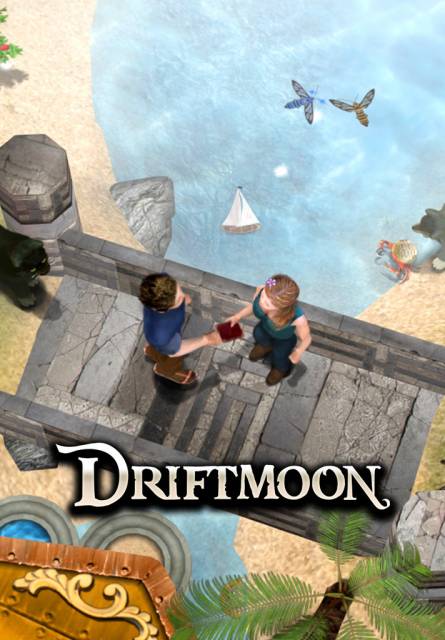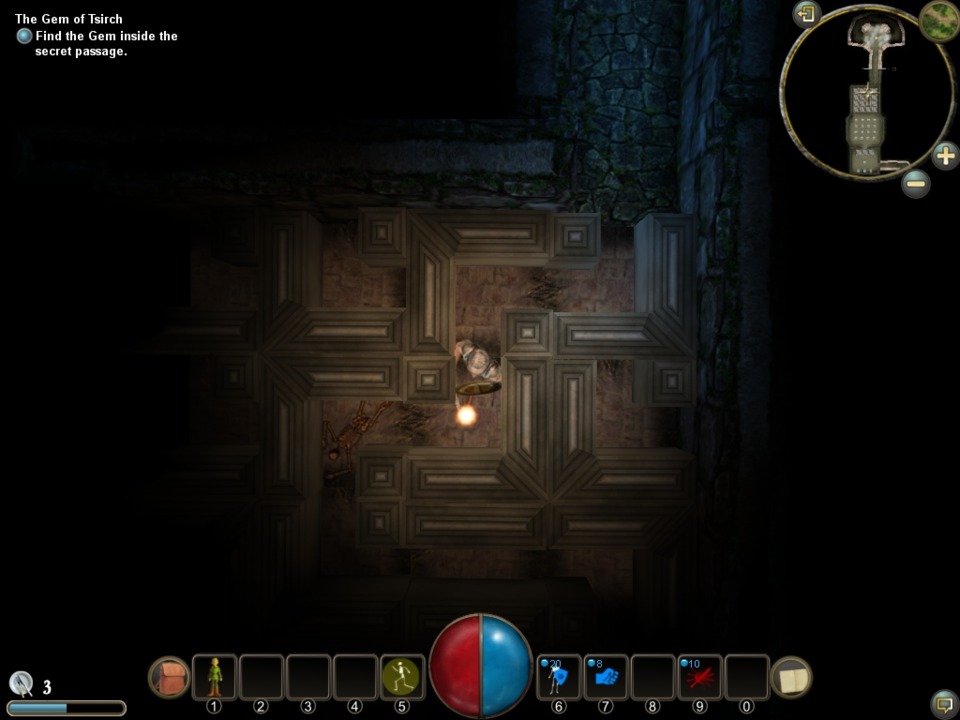Indie Game of the Week 43: Driftmoon
By Mento 1 Comments

Playing Indie games sometimes feels like taking a step back in time, though rarely in the negative sense. More that, the designers of Indie games are frequently those with a long history of gaming and of a specific favored strain in particular. The solo creator of an Indie spacewhipper, for instance, was almost assuredly raised on a diet of Super Metroid, Castlevania: Symphony of the Night, and their many contemporaries and yearned to make one of their own one day. Instant Kingdom's Driftmoon, conversely, feels both like a CRPG made in the early 00s when the static environments of the Infinity Engine was giving way to the more flexible Aurora Engine of Neverwinter Nights and co., and a game that is entirely its own, modestly-budgeted and modestly-sized affair. You could make many allusions to older RPGs also, Ultima in particular, but really it feels like a microcosm of a particular branch of action-RPG with a focus on story and puzzles that you don't see too often these days, especially when most Indie RPGs are happily aping the 16-bit console era or adapting some heavily strategic XCOM variant for its combat. Driftmoon, without sounding too reductive, is a relatively straightforward game with a tale to tell, a cast of humorous and colorful characters to converse with, and some detailed if blocky environments to explore. It didn't surprise me in the least to discover it was the brainchild of an adorable Finnish couple who make games together: it gives off that endearing "labor of love" vibe that so many Indie games do.
I really like the world of Driftmoon first and foremost. The story is boilerplate - you're the son (or daughter, if you install the gender change mod) of a proficient alchemist who finds himself captured by evil lizardmen and brought to the volcanic lair of a legendary undead king to help him take over the world. Naturally, there's an artifact involved, the parts of which have been scattered to the four winds for the player to find and assemble in order for them to defeat the undead king, rescue their father, recover their doomed hamlet of petrified villagers, and save the world in a more general sense. The characters you encounter are fun, the companions you recruit work as moral support and handy invincible meatshields, and some effort has been made to make even the antangonists memorable. Your time-travelling inventor brother, for instance, who accidentally ends up making the elaborate ancient trap-filled dungeons for you to pass through, or an especially chipper firefly companion who frequently acts as a light source. Dialogue is delivered in the traditional Infinity Engine format (though the game itself is not Infinity Engine-based, but instead uses a top-down perspective of 3D environments) with a portrait of whoever might be talking and lists of dialogue responses to choose from, though you rarely see anything as elaborate as conditional bonus options for having particular specific stats and skills.
In fact, most of the more traditional RPG elements of the game - equipment, levels, stats, abilities - are rudimentary or side-lined for the most part. There aren't too many ways to spec a distinctive character build, and since every stat provides a different but equally useful benefit you're better off spreading your points across them than trying to min-max. Likewise, you spend a skill point per level on a skill tree, but it's hardly Path of Exile's intimidating "Spider Web from Hell": rather, there's about twenty or so skills with each one offering three levels of mastery and most are blocked until you reach a specific level or have the prerequisite skill. I generally opted for the melee skills and passives, but there's a branch for archery if you find that more to your liking (some enemies demand ranged, since they explode when they die or get too close, while others are completely immune to arrows). You'll be getting all your XP from quests and monsters, and occasionally new points in a hidden morality stat - Karma - which can be used to increase the strength of your comrades. It's all fairly perfunctory, and certainly not the draw if you're looking for an elaborate RPG.

So when I say I like the world of Driftmoon, I'm specifically referring to how exploration works. In addition to moving around each of the game's maps, you also have the ability to push and pull polygonal objects in the environment like boxes and chairs to create new pathways, solve puzzles or uncover valuable items lying underneath. A game-wide scavenger hunt for the well-hidden silver feathers provides an extra point of mana for each one found - mana effectively works like stamina in this game, regenerating quickly outside of combat and powering all spells and special attacks, so it's useful to build a big reserve - and there's also stat-boosting goldfish (though you need to spend a skill point to even see them, and another to be alerted to one if it's nearby) and various other useful items off the beaten path. Weapons and armor are given sparingly across the game, with each new one being slightly stronger than the last - this is akin to something like Undertale, which similarly streamlined a lot of common RPG elements. You can also gather ingredients and craft them into potions and other consumables, or additional arrows for your ranged weapons. In addition to a moderate variation in the items you can find, there's also various traps, secrets and surprises to discover in each of Driftmoon's regions that make them a small joy to explore, and the game tallies how many quests you have available in each region on the world map so you never have to feel like you're missing out on anything before moving on.
With the right mindset, Driftmoon's biggest weaknesses - its relatively short size and its lack of mechanical depth - could also be seen as virtues. It's an undemanding game, one that is happy to entertain you for a couple of days with a warm and humorous adventure without overshadowing its story with too many branching paths, diverse character builds, elaborate combat mechanics, or anything else that might distract from its breezy nature. It's obviously not going to be for everyone for those very same reasons, and you might find it far too slight for its own good next to the more complex throwback RPGs that Obsidian or InXile have been putting out of late, but it has this affable, modest charm to it that I really appreciated in a sea of big releases, especially around this time of the year when I'm salivating to jump into the likes of Nier: Automata and Horizon: Zero Dawn, having just acquired copies of both. I was concerned that Driftmoon would wrestle away too much of my free time this week, but it turned out to be the equivalent of an enjoyable 200-page fantasy pulp novel rather than some dour expansive doorstop of a tome. I can't speak for everyone's expectations for this genre in this market, but a brisk, light-hearted Indie RPG like this was just what I needed.
Rating: 4 out of 5.
| < Back to 42: Stories Untold | > Forward to 44: Flinthook |
